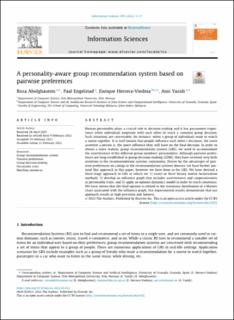| dc.contributor.author | Abolghasemi, Roza | |
| dc.contributor.author | Engelstad, Paal E. | |
| dc.contributor.author | Herrera-Viedma, Enrique | |
| dc.contributor.author | Yazidi, Anis | |
| dc.date.accessioned | 2022-07-08T13:53:27Z | |
| dc.date.available | 2022-07-08T13:53:27Z | |
| dc.date.created | 2022-04-10T23:26:54Z | |
| dc.date.issued | 2022-02-25 | |
| dc.identifier.citation | Information Sciences. 2022, 595 1-17. | en_US |
| dc.identifier.issn | 0020-0255 | |
| dc.identifier.uri | https://hdl.handle.net/11250/3003892 | |
| dc.description.abstract | Human personality plays a crucial role in decision-making and it has paramount importance when individuals negotiate with each other to reach a common group decision. Such situations are conceivable, for instance, when a group of individuals want to watch a movie together. It is well known that people influence each other’s decisions, the more assertive a person is, the more influence they will have on the final decision. In order to
obtain a more realistic group recommendation system (GRS), we need to accommodate the assertiveness of the different group members’ personalities. Although pairwise preferences are long-established in group decision-making (GDM), they have received very little attention in the recommendation systems community. Driven by the advantages of pairwise preferences on ratings in the recommendation systems domain, we have further pursued this approach in this paper, however we have done so for GRS. We have devised a three-stage approach to GRS in which we 1) resort to three binary matrix factorization methods, 2) develop an influence graph that includes assertiveness and cooperativeness as personality traits, and 3) apply an opinion dynamics model in order to reach consensus. We have shown that the final opinion is related to the stationary distribution of a Markov
chain associated with the influence graph. Our experimental results demonstrate that our approach results in high precision and fairness. | en_US |
| dc.description.sponsorship | The work of the third author is supported by both Spanish State Research Agency Project PID2019-10380RBI00/AEI/10.13039/501100011033 and Andalusian Government Project P20_00673. | en_US |
| dc.language.iso | eng | en_US |
| dc.publisher | Elsevier | en_US |
| dc.relation.ispartofseries | Information Sciences;Volume 595, May 2022 | |
| dc.rights | Navngivelse 4.0 Internasjonal | * |
| dc.rights.uri | http://creativecommons.org/licenses/by/4.0/deed.no | * |
| dc.subject | Group recommendation systems | en_US |
| dc.subject | Pairwise preferences | en_US |
| dc.subject | Group decision-making | en_US |
| dc.subject | Personality traits | en_US |
| dc.subject | Reaching consensus | en_US |
| dc.title | A personality-aware group recommendation system based on pairwise preferences | en_US |
| dc.type | Peer reviewed | en_US |
| dc.type | Journal article | en_US |
| dc.description.version | publishedVersion | en_US |
| dc.rights.holder | © 2022 The Authors | en_US |
| cristin.ispublished | true | |
| cristin.fulltext | original | |
| cristin.qualitycode | 2 | |
| dc.identifier.doi | https://doi.org/10.1016/j.ins.2022.02.033 | |
| dc.identifier.cristin | 2016571 | |
| dc.source.journal | Information Sciences | en_US |
| dc.source.volume | 595 | en_US |
| dc.source.issue | 595 | en_US |
| dc.source.pagenumber | 1-17 | en_US |
| dc.relation.project | Agencia Estatal de Investigación: PID2019-10380RBI00/AEI/10.13039/501100011033 | en_US |
| dc.relation.project | Junta de Andalucía: P20_00673 | en_US |

